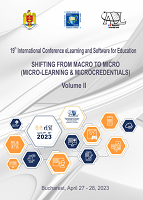VOLCANIC SHOCK WAVE ANALYSIS VIA PROJECT BASED LEARNING
VOLCANIC SHOCK WAVE ANALYSIS VIA PROJECT BASED LEARNING
Author(s): Iulia-Ștefania ArmeanuSubject(s): Education, School education, Environmental interactions, Sociology of Education, Pedagogy
Published by: Carol I National Defence University Publishing House
Keywords: project-based learning; volcano eruption; educational physics;
Summary/Abstract: This study provides an example of project-based learning (PBL) in science, which promotes self-directed learning among students and teaches them the fundamentals of research through active engagement, clear context, and social interaction. The present teaching method engages students in real-world issues or problem that guides their learning and enables them to develop their own ideas and solutions, as well as social interaction. Therefore, the paper illustrates how basic wave analysis can be conducted in an accessible manner using one of the most powerful volcanic eruptions ever recorded on Earth as an example. This aspect may be considered promising as it highlights the importance of analysing environmental phenomena and how recorded data can contribute to scientific discoveries. The project employs a method to determine the speed of shock waves produced by volcanic eruptions by using atmospheric pressure anomalies recorded by two meteorological stations in Romania in order to understand and characterise the power of the Hunga-Tonga Hunga-Ha'apai eruption on January 15, 2022. Basic physical and mathematical techniques were used in computations and the results are compared with the ones from the scientific literature. In addition, cartography and calculation software were used. Overall, the project presents a practical and engaging way to learn about the fascinating world of volcanic activity.
Journal: Conference proceedings of »eLearning and Software for Education« (eLSE)
- Issue Year: 19/2023
- Issue No: 02
- Page Range: 18-27
- Page Count: 10
- Language: English

